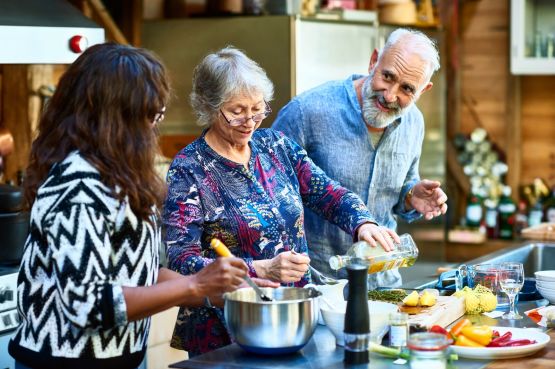Eating and exercising for healthier lungs
You might not give much thought to your lungs, but they play a key role in your health and wellbeing and looking after them is crucial. Whether you already have a lung condition, or you’re interested in preventing one, here I’ll share my top tips for improving your lung health.

What to eat for healthy lungs
Eating well can improve all areas of your health. When thinking about your lung health, it’s important to focus on supporting your immune system. This is because keeping your immune system strong will help you to fight off respiratory infections.
Respiratory infections can affect the lungs of healthy people. But they can also make underlying conditions such as asthma, COPD (chronic obstructive pulmonary disorder), or lung cancer worse.
To keep your immune system functioning well try to:- eat a brightly coloured diet with a range of vegetables and fruit
- choose wholegrains
- supplement vitamin D from October to March
- eat a range of proteins such as beans, lean meats, and eggs
Stay a healthy weight
Managing your weight is also important for the health of your lungs. This is because carrying extra weight around your tummy can make it hard for you to take deep breaths. And it can cause breathlessness, as being overweight can make your lungs and heart work harder.
This means you might find you get out of breath more easily. Not just when you are exercising but also when you are doing everyday movements such as bending over.
But being underweight can negatively impact your lung health too. This is because it can weaken the muscles which help you to breathe. And it may reduce your immune function so you’re more likely to get lung infections.
To stay a healthy weight, you should:
- Eat plenty of fibre and protein rich foods to keep you full (like wholegrains, fish, and eggs)
- Reduce your intake of alcohol and sugar sweetened drinks
- Stay hydrated, as hunger can be mistaken for thirst
- Try to eat less ultra-processed foods (sweets, biscuits, pastries, and crisps)
- Get 30 minutes of exercise 5 times a week
How to exercise for healthier lungs
Having stronger muscles can improve your lung health. This is because when your muscles are stronger, they require less oxygen.
Your lungs use muscles to breathe too, such as the diaphragm. So, when those muscles are stronger, you can breathe more efficiently.
Being fit and strong can also improve your immune response, help you with your weight, and reduce your stress levels. Reducing stress can help with lung conditions such as asthma.
If you’re worried about your lung health, it can be understandable that you don’t want to do things that make you breathless, such as exercise.
But this can make things worse - if you don’t exercise, your lungs can weaken and this can cause increased breathlessness.
So, gradually building up your exercise levels can help. As well as trying to get used to the feeling of being out of breath from exercise.
Exercises to improve your lung health
To improve your lung health, start to increase the amount of time you’re active for. This can include standing up instead of sitting down when attending an online meeting. You could also take the stairs instead of escalators and do more active housework or gardening.
Cardiovascular exercise
You can also focus on increasing your cardiovascular activity. This means doing more activities such as brisk walking, cycling, dancing, jogging, or swimming.
If you’re new to exercise you could consider using an app such as Couch to 5K, which helps you build up to jogging 5K.
You could also join a team exercise session such as netball, football, or aerobics.
It’s usually recommended that when you do aerobic exercise, you should still be able to talk but not sing. This means you are strengthening your heart and lungs without overdoing it.
Strength exercise
As well as increasing your cardiovascular exercise, aim to increase your strength training too. Two sessions a week is a good goal.
There are many different types of activities which help you strengthen your muscles. These can also improve your lung health.
These include activities like Pilates, weightlifting, bodyweight workouts, and using resistance bands. Stair climbing and using indoor exercise bikes can build your muscle strength too.
You could also try to incorporate more strength-based movements into your daily life. Try standing up without using your arms for support and carry your shopping bags home from the local shop instead of using the car.
Try yoga
You might not think that yoga will give you much of a workout. But yoga can strengthen your muscles and improve your cardiovascular fitness too.
Yoga can also make you more aware of your posture, which may improve your breathing patterns. Yoga includes lots of breath awareness, which can help you to notice how you breathe during the day.
Some studies have shown that yoga can help you to take fuller, deeper breaths, and to avoid breathing quickly from your upper chest.
All these things can help to improve your lung health. But if you’re worried about your breathing or have a lung condition that’s difficult to manage, see a doctor to get the best help and support.
Are you interested in learning more about your health? Discover more about our range of health assessments.
-
Sources Sources
- Healthy Eating. UK Government. www.gov.uk,accessed 14 April 2023
- Eating well. Asthma and Lung UK. www.asthmaandlung.org.uk, accessed 14 April 2023
- Asthma triggers. Asthma and Lung UK.www.asthmaandlung.org.uk, accessed 14 April 2023
- Boosting immunity. British heart foundation. www.bhf.org.uk, accessed 14 April 2023
- Iddir M, Brito A, Dingeo G et al. Strengthening the immune system and reducing inflammation and oxidative stress through diet and nutrition: considerations during the COVID-19 Crisis. Int J Behav Nutr Phys Act.2019;16. https://doi.org/10.1186/s12966-019-0789-2
- Maintaining a healthy weight. Asthma and Lung UK. www.asthmaandlung.org.uk, accessed 14 April 2023. https://www.asthmaandlung.org.uk/living-with/healthy-eating/weight
- Physical activity. Asthma and Lung UK. www.asthmaandlung.org.uk, accessed 14 April 2023. How much physical activity should I do? Asthma and Lung UK. www.asthmaandlung.org.uk, accessed 14 April 2023
- Sivaramakrishnan D, Fitzsimons C, Kelly P et al. The effects of yoga compared to active and inactive controls on physical function and health related quality of life in older adults – systematic review and meta analysis of randomised control trials. Int J Behav Nutr Phys Act 16, 33 (2019). https://doi.org/10.1186/s12966-019-0789-2
- Morimoto K, Horibe S, Takao R et al. Positive Effects of Yoga on Physical and Respiratory Functions in Healthy Inactive Middle-Aged People. Int J Yoga. 2019 Jan-Apr; 12(1): 62–67.doi: 10.4103/ijoy.IJOY_10_18
About our health information
At Bupa we produce a wealth of free health information for you and your family. This is because we believe that trustworthy information is essential in helping you make better decisions about your health and wellbeing.
Our information has been awarded the PIF TICK for trustworthy health information. It also follows the principles of the The Information Standard.

More general health advice articles
Did you find our advice helpful?
We’d love to hear what you think. Our short survey takes just a few minutes to complete and helps us to keep improving our healthy lifestyle articles.
Legal disclaimer
This information was published by Bupa's Health Content Team and is based on reputable sources of medical evidence. It has been reviewed by appropriate medical or clinical professionals and deemed accurate on the date of review. Photos are only for illustrative purposes and do not reflect every presentation of a condition.
Any information about a treatment or procedure is generic, and does not necessarily describe that treatment or procedure as delivered by Bupa or its associated providers.
The information contained on this page and in any third party websites referred to on this page is not intended nor implied to be a substitute for professional medical advice nor is it intended to be for medical diagnosis or treatment. Third party websites are not owned or controlled by Bupa and any individual may be able to access and post messages on them. Bupa is not responsible for the content or availability of these third party websites. We do not accept advertising on this page.







